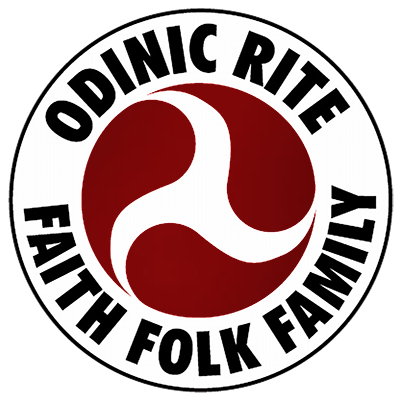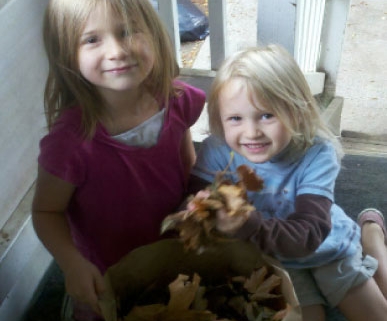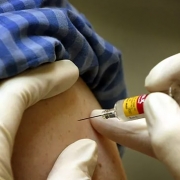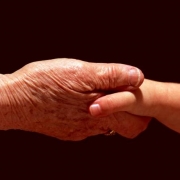Navigating the Maelstrom – Part 2: Toddlers and Preschoolers
By Hyndla OR
In the prior article we covered our family’s experiences with infants. Whenever something is written, some things are forgotten, and I wanted to cover a few things before moving on to Toddlers and Preschoolers.
Weaning
There are many thoughts out there on this subject. For our family, it was a matter of how much Mom could endure and each time it was different for each child. With Astrid, I was an ignorant young girl that didn’t care for myself, hence lost my milk at 3 months. Each child I made a mental commitment and said that there was no other option, but to nurse as long as I could. With each child, when they started biting, I started weaning! I suggest it isn’t addressed till after the baby is a year old. Typically an infant’s immune system isn’t developed until 18 months, so nursing for 18 months would be a great first goal.
The key to weaning is to ease off slowly until your body naturally starts changing your milk supply. I know many women that only nursed their baby to sleep at night. It is completely up to Mom. The interesting thing about breast feeding is that when the baby nurses he/she gives Mom’s body signals to change what nutrition that baby needs, so when you are weaning, the body will change the milk to ensure the baby gets all the nutrition. Nature is an amazing thing…provides for our well being and balance despite our best intentions.
Diapering
Although simple, diapering can be a very important part of a baby’s upbringing. If you stop and think for a moment, a diaper is on a baby’s bottom from birth to around 2 years old. Two years of constant contact with the most delicate part of an infant! This is why we chose to use cloth diapering.
The key to cloth diapering is cleanliness. Every diaper that comes off must be rinsed immediately and laundered frequently. I would rinse and put in a sanitary bucket. Every evening I would wash them. If you create the habit, cloth diapering is rather easy. Some things to remember, when washing with bleach make sure to add a cup of vinegar in the rinse cycle to ensure all bleach is neutralized. The better choice is to wash the diapers in dye/phosphate free detergent, and baking soda or borax, whilst still using vinegar to neutralize in the rinse cycle.
When I first started there were almost no fancy little diaper covers, organic cottons, or safe diaper pins. Just plain ol’ Gerber cloth diapers, vinyl pants to cover, and old fashion diaper pins. If a new parent wants to cloth diaper, the options are endless. It used to be a pain going on outings using cloth, but I just muddled through it with plastic bags, wash rags and extras of everything, but again with all the options available, it is more convenient now to cloth diaper.
Diaper rash is a major issue that can be avoided with cloth diapering, but not completely. My lil ones still got diaper rash now and again. The key is to ensure that the bottom is dry and clean. We tried using Desitin and those types of zinc/petroleum based creams, and never felt they worked well. Once I learned about herbal treatments, I made my own bees wax based ointments. A great one is Comfrey Salve. Simmer a tablespoon to a quarter cup of comfrey root in a cup of olive oil for 20 minutes, and strain. Stir in 2 oz of beeswax and allow cooling. If the mixture is too loose, warm and add more beeswax a little at a time till the right consistency. This is *amazing* cream that heals nearly any skin condition from burns, to diaper rash to new tattoos. Once you are comfortable making this, you can start adding other herbs such as calendula, arnica, etc… The cost to make this is a fraction of what you would purchase at the store. You can also use other media such as Jojoba oil, or virgin coconut oil, etc.
Toddlers
As infants start to crawl and move around, they can start discovering their world independent of their parents. Although this is a great time of development, it is also a great time to get into mischief! Their little lives have been coddled and protected by Mom and Dad so they don’t have consequences for their actions. As mobility is increased, so is curiosity. This little person is learning at an extraordinary rate, not just cognitively, but biologically. From the age of one to five, it is said that the toddler/preschooler learns the most out of any other time in their life! It is important to *not freak out*. Our inclination is to make a safe and sanitary atmosphere where our little one can never hurt his or herself. We did not take this stance with our children.
As with my prior statement, your baby should be acclimated to your world as it is. Our house is loud, crowded, and cluttered. We have dogs, cats, chickens and hamsters. This is our house. Although we always ensured our babies were safe and protected, we didn’t over baby proof our house except for the things that are deadly (i.e. safety locks on the cupboards, plug covers, etc). Otherwise, we kept a clean house and let the little ones learn in our atmosphere. From rolling, to crawling, to walking, each progression proved to be a new challenge, and a new experience for our whole family. The most gratifying is for our older children to mentor our younger kids. Sometimes, I had to bite my tongue with my inclination to stop them from rough housing with the 2 year old, or taking the 1 year old out in the muddy yard with no shoes. Both of those seemingly minor things are paramount to building an immune system as well as cognitive abilities from infant to kinder. Although, there are things I could have done better, I am proud to say that all our kids have strong immune systems with an appetite for adventure and discovery.
Terrible Twos
One can’t discuss the “terrible twos” without discussing discipline. As most parents immediately get their hackles up when it comes to discipline (i.e. my discipline is right and yours is wrong), I am not here to do so. The word discipline means to teach. Our job as parents is to teach our children proper behavior and to discipline themselves when no-one else is around. How that is undertaken is different not only from family to family, but also from child to child. Where spanking works with one child, time outs work with another. Children are unique, so they need a unique approach to learning. No one knows their children better than their own parents, so it stands to reason that parents are the best equipped to choose the discipline that works best for their families/children.
With that said, sometimes parents are at a loss as to what to do with a willful, adventurous, sassy 2 year old. The little bundle of joy that you have cuddled, giggled with, read fun little stories, played chase, etc. all of the sudden is telling you, “No!”, throwing his/her food at you, and breaking everything. What happened? It is simple; he/she just realized a new power, manipulation of Mommy and Daddy with their actions for their own entertainment (tongue firmly planted in cheek). He/she wants to know just how many times they can throw that toy on the floor until Mommy won’t pick it up again, and then he/she will test their hypothesis several times a day. How far will Dad chase me to catch me? What happens when I say, “No”? Where does that street lead me? The world of a two year old is one of great discovery, but also finding one’s own independence. It is always a struggle from two-ish to five-ish. You don’t want to squash creativity, but you also are the parent. I always started discipline from birth. Reading to the infant, infant massage, infant sign language, etc., although subtle, starts the road to orderly thought, growth, and eventually good behavior. A healthy, strong, intellectually stimulated child is better behaved than one that didn’t get such a good start on life.
As the little one starts to be mobile, gentle discipline where consequences for actions are emphasized starts the baby on the path of action and reaction. As time passes, the toddler will still test boundaries, but the response to Mom and Dad’s discipline is different than say a child that hasn’t had any discipline until he/she turns two. Don’t get me wrong, for us there are times that I have had to nip a behavior in the bud pronto because the outcome of the behavior was much more dangerous or even deadly than the disciplinary act. For example, a child getting swatted for running in the street pales in comparison to getting run over by a car. For the most part, discipline for us was well received and the kids learned proper behavior. The other key is redirection. There has been many a time a fit was redirected to a giggle with a simple change in atmosphere. This doesn’t always work, but it can be a good first step. Often times toddlers see things much differently than an adult, so a scary thing to them is completely innocuous to us. Asrekyr always took a different approach to these issues. For instance, Astrid was afraid to walk into a dark room. Asrekyr handed her a wooden sword and shield to defend herself. Pretty soon she was giggling and loving that she could play “soldier” and go into the dark room. Asrekyr is the master of redirection. With a little creativity, discipline won’t always equate to angry parents.
The other part of discipline is respect for the parental role. I am not one of those folks that believe parents need to be “friends” to their children. I believe the role is as mentor, parent, and advocate. When that role is blurred, so too is the child’s understanding of respect for elders and authority. In our child’s eyes, we have answers to nearly all questions, moral grounding, strong character, and clear focus on what is best for their future. Now once they are teens, that all changes, but only in that they are finding their own moral grounding, strong character and clear focus on their own future while realizing that their parents aren’t perfect. It is gratifying to hear our kids say, “Ask my Mom/Dad, they will know the right thing to do.” This faith despite their constant reminder of our imperfections. That kind of respect doesn’t grow overnight, it starts at birth. Regardless of the type of discipline a family uses, this clearly defined role is what makes that discipline stick.

Potty Training
I am going to make a profound statement….I can’t tell you how to potty train your toddler. Each and every one of our 7 children was different. Just when my smug self thought I had it mastered, the toddler would remind me of my humanity and taught me extreme patience. What I can tell you is what seemed to work most of the time.
First things first, if you are an attentive parent and your child is healthy, your child will not be going to Kindergarten in diapers. So with that pressure off, you can relax and let your child guide the process. One thing I am adamantly against is “pull ups” when trying to train. If your child wets her pants, she does. That is that. Change them and start with a new pair. I used the vinyl diaper covers when we went on outings and didn’t get hung up on if their clothes got messed up. Having used cloth diapers for so long, I was conditioned to deal with dirty pants and leaks. Again, now they have all kinds of innovative ways to get around accidents, but in the end you want your toddler to know what it feels like to sit uncomfortably in wet pants.
The first signal that your child is ready to start trying out the potty is the ability to stay dry through the night. Also, she might have interest in going on the potty. Although probably a novelty at first, it may be fostered into wanting to use the bathroom instead of pants for urinating! One thing to avoid is prizes for using the rest room. There was a study of tribal parenting as opposed to western parenting. It found that in tribal situations, milestones such as “potty training” were more matter of fact. For instance, the Tribal Mother didn’t reward something that was expected, whereas, the Western Mother rewarded the child.The result was that the Tribal Mother had more success without the bells and whistles. I took this to heart and can say that potty training with my older children was a chore that I stumbled and bumbled through, and potty training with my younger children was smooth and uneventful. Each family/child is different, but this is my experience!
With that said, the best advice I can give is to not pressure your little one. She is already in defiant finding-my-independence mode, it can turn into full revolt with pressure to go on the potty! I have done it and experienced it and when I finally backed off and let her do her thing, guess what happened, she used the restroom. Good advice for their entire lives.
Preschool
Although learning starts at birth, the learning is more passive. As the baby moves to toddlerhood, it becomes more active. This stage is called the Poll Parrot stage because the toddler/preschooler parrots everything you say/teach. Also, this stage is about concrete facts, not philosophical notions, deductive reasoning, or making conclusions. The 3 year old may ask, “Why?” a thousand times, but it isn’t because they want to hear some long drawn out explanation as to why the sky is blue. They just want to hear you say the answer regardless of what it is. This opens up a can of worms a bit because even if they think we know everything, we don’t, so how do we answer why something is? I always just opened a book or googled it. We have so many books around our house that finding a book that answers a question in an age appropriate manner was fairly simple. My best advice is to have an atmosphere of learning for both parents and children.
Since this is a “just the facts” stage, it is important to give the child just the facts! When I first started homeschooling, I was so excited to teach Astrid and Thora. I could teach them all the stuff I missed. The poor things were bombarded with so much information, that pretty soon they were tuning me out. Instead of teaching them about sea life, I was trying to comprehensively teach them about eco systems, and ecology. If they loved whales, I was teaching them about why they were going extinct. After a couple months, I bought a book to teach me how to teach my children. Come to find out, they just want to learn a whale is a mammal that lives in the ocean and migrates. They loved killer whales, and they eat seals. Life became much simpler when I realized that they only need the facts and want the facts. My philosophy with my children became: keep it simple, stupid! (KISS). My best advice is to relax and enjoy the facts for a while; it brings a sort of serenity to know that the why will be a logical conclusion of the facts later in those logic years.
Physical activity is also crucial in the preschool years leading up to Kindergarten. Those timeless activities of jumping rope, hopscotch, bike riding, climbing, bouncing balls,and swinging are critical to proper motor skill development. Just like scribbling helps the fine motor skills, skipping helps large. It also helps develop the brain and is very important to neural pruning that largely occurs in the preschool years. Again with the KISS method to child rearing, these simple things are just that simple. Take the time to visit a great park with monkey bars, climbing structures, and swings. Trampolines may be a blast once in a while, but a jump rope will give daily entertainment and produce the same cognitive results. Having a tree to climb in the front yard is a natural play structure. No trees? How about going on a hike? We have always kept our children physically active and as a result they are all fit and healthy. Creating the habit when they are young carries through to adulthood.
Nutrition
We have a saying in our house, “there are two things on the menu take it or leave it.” (Buddy Hackett) I am not a mother that makes 9 different meals 3 times a day. Not even one different from the rest. Frankly, part of being in a family is sharing in that experience, not being separated from it. I also don’t have kids that have severe allergies, which would be the only exception in my opinion. From the time the kids ate regular food; they ate with the family and ate what the family ate. So if we were having tacos, so too did the toddler. I would make it easy to eat for him, but they ate what we ate. If he turned up his nose to it, he/she didn’t get anything till the next meal. What usually happened is he would eat the next meal completely and not turn up his nose again. As a consequence, I just made a Vegetarian Moussaka and everyone from the five year old to the 18 year old, including Dad, ate it. My point is that if you offer a healthy, organic, whole food menu and follow the above adage, your family will eat it. My philosophy with nutrition is: our job as parents is to fill our children with the very best while they are young because once they get out in the world the choices are not so clear and easy as they were at home, and at least they were started on a foundation of a wholesome lifestyle.
With that said, it is important that as your little one grows they have a diverse diet to avoid food intolerance and allergies. We always make a menu, so each day is balanced. For example, our kids only get cereal one day a week. We have a family issue with gluten, so we stay away from bread and bread products as much as possible. Also, snacks consist of vegetables, cheeses, and fruits. These are still given in moderation. Garbage in, garbage out is our motto. Don’t get me wrong, we have pizza night, and occasional special dessert. It is just not with every meal. For toddlers, we limited it more than with older kids. Again the years from birth to 5 are crucial developmentally.
An example of our menu:
Monday
Breakfast – Steel cut oats with butter and honey with banana.
Lunch – Chicken on greens with balsamic vinaigrette
Dinner – Fish, rice, and green beans
Snacks – celery and cream cheese or peanut butter/apples and peanut butter.
Simple, yet nutritious. Beverages consist of water and one glass of juice a day.
We also use a lot of leftovers simply because having a large family, I make large meals, and inevitably we have leftovers. This may come as dismay to a toddler that turned up his nose at last night’s dinner to only have it set in front of him for lunch two days later! It is a good lesson though, of waste not, want not.
A significant lesson is cooking and kitchen safety. Toddlers are at a great age to start helping with meal preparation. There are so many lessons in the kitchen from measuring to safe use of a knife. Although when they are young and only observers, they can still get so much from putting on an apron and stirring the pancake mix. Also, it opens up opportunities to learn responsibility such as cleaning up after one’s self, and enjoying the fruits of one’s labor. Our little ones have always pulled up a chair to crack an egg, stir the soup, or even put herbs in the mead. Not only responsibility, but family bonding!
We include our toddlers in every facet of our lives from sharing in a long novel with older children to trying out alligator meat to burying our beloved pet that died. Life isn’t compartmental, it is lived organically and synergistically. Like our Folkway, it is symbiotic. We may want to protect our children from the horrors of our world, keep their innocence, but we need balance that protectionism with letting them live in the world that they were born into. Sometimes it means saying goodbye to our family pet, or falling off the bike and skinning knees and sometimes it is finding out for the first time that life isn’t fair and sometimes you get in trouble when you didn’t do it. All valuable lessons which add to the formation of the whole being.
Hyndla OR









These articles are incredible, I am enjoying this one in particular. Do you have any dealing with kids K-6?